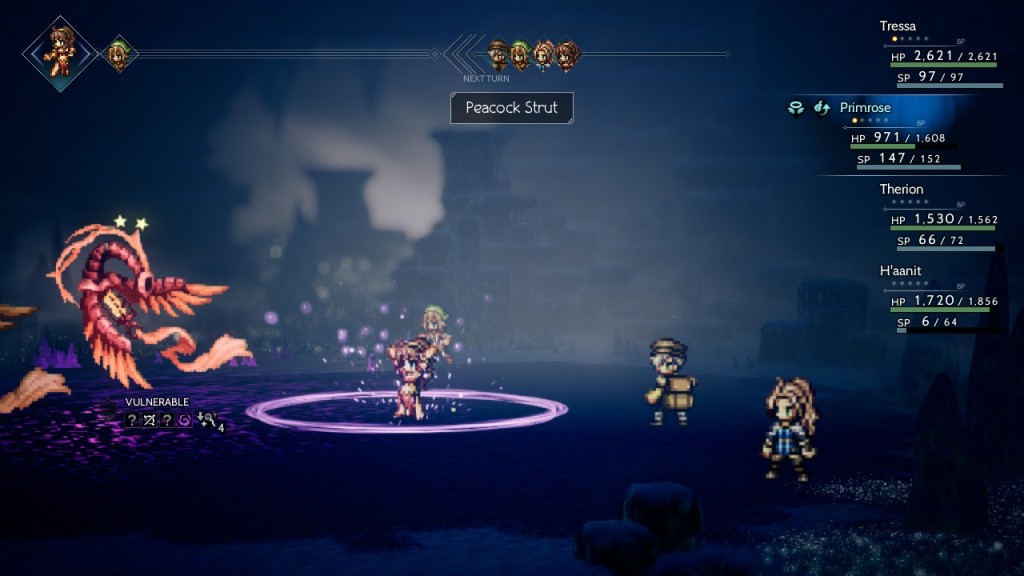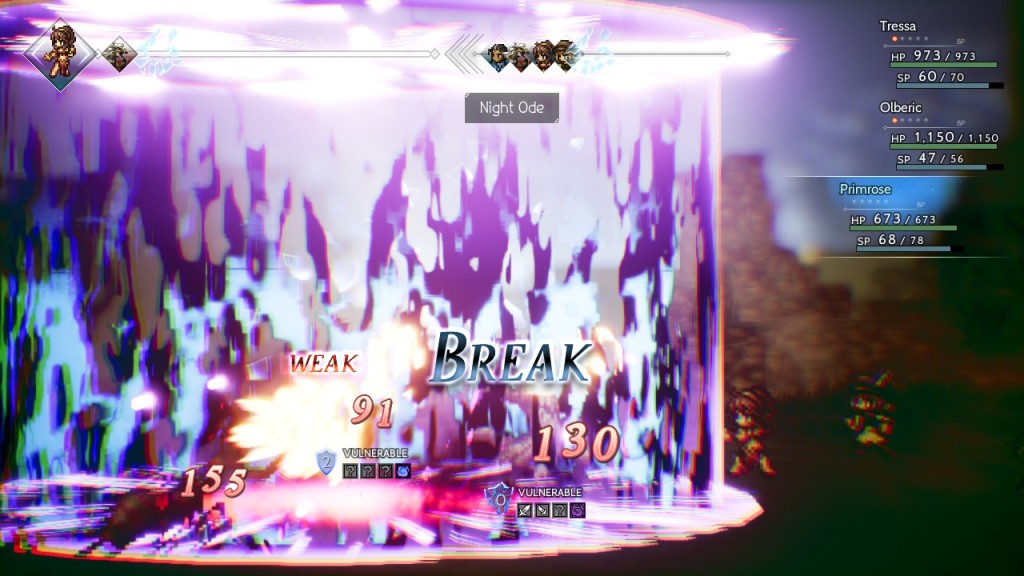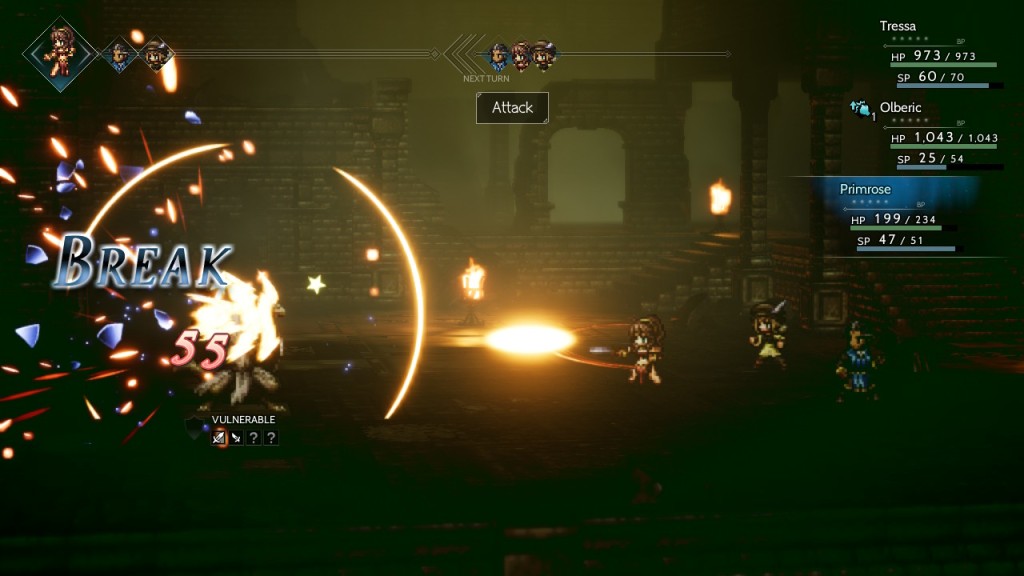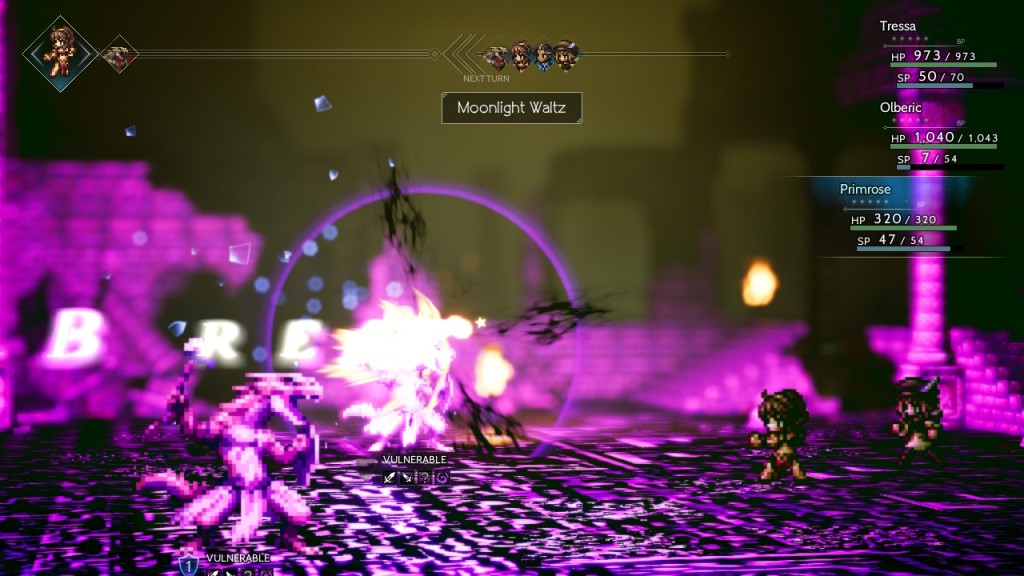
Octopath Traveler is a Nintendo Switch title that pays homage to classic role-playing, turn-based games with some modern touches by the minds at Square Enix. Gameplay is not overly complicated, as it focuses on boosting abilities and breaking weak points to create openings, though it still requires quite a bit of strategy for the hardest bosses. Old-fashioned as it may be, Octopath Traveler does enough to have its own spotlight despite its own unique challenges. What do I mean by challenges exactly? Bravely click for more down below!
Review: 8.5/10
Story
Choosing from eight travelers, you get to pick who will be with you for most of the journey, locked from switching out until you complete their part of the story. Though soon enough, you will join up with all the others to see their chapters as well. Instead of having an entire campaign focused on one or few main characters, Octopath Traveler is set up as smaller short collection of stories that become loosely connected towards the end, which has its strengths and weaknesses.
At least to me, I felt there wasn’t enough reason(s) (or no reason at all in the beginning besides being kind?) beyond gameplay for these characters to join together and continue to stick by each other throughout the game. There should’ve been more cutscenes and intermediary chapters to solve this major problem. Another related issue is how I’d be taken out of the immersion when tragic events happen and yet somehow the party is missing when someone is in trouble as if he or she was always alone on their quest.
Yes, there are “travel banter” conversations usually between two or three characters at a time, but most of them are light dialogues like “idle chitchat” that, while fun and builds friendships or adds odd humor, doesn’t contribute much to the main story. Why would someone like Olivia trust people like Primrose and Therion when they have seduced or otherwise tricked and stolen from others? There is a lot there, a ton of potential, (Possibly different story paths that could’ve changed based on actions taken and who’s in your party at the time of those decisions, for example.) but none of that is really explored.
To understand what I’m talking about, an easy example of this is how Primrose and Olberic could have had a stronger connection, something both of them could relate on (Bear with me here!). I recently started a new game with Primrose as my choice and after completing her first chapter, I quickly ran into Olberic for his beginning. He simply says (as a default to regardless of who talks with him) that you look capable of fighting and needs help in saving a boy named Philip from nearby bandits. However, why would Primrose give aid with nothing in return? She could have felt a shared sense of pain in how Philip had lost his father and decides at that point to help simply so his mother wouldn’t lose her son and be the last of her family left alive (and indirectly gain a bit of different kind of closure). Unable to trust each other at first (let’s say due to being strangers and very different from each other), Primrose and Olberic afterwards could have slowly and gradually opened up to each other and agree to journey onward together.
Gameplay
If you’re familiar with many of the turn-based games and franchises out there like Shin Megami Tensei/Persona, Bravely Default, Child of Light, and so on, Octopath Traveler is not so different gameplay-wise. There is a good mix of fighting and exploration.
Each character has their own main class or job (that cannot be changed, but makes them unique with the “Path Actions/Talents“) with the option of a secondary job that expands weapon and skill possibilities. There are a total of 12, 4 of which are hidden.
Path Actions are abilities outside of combat that let you recruit or fight NPCs, buy or steal items, and acquire information mainly for side quests; there is little consequence for “Rogue” decisions unless you failure a certain number of times and then all you have to do is pay a varying fine to the town or city’s bartender to restore your party’s reputation. Talents are abilities that mostly help in combat like analyzing weaknesses, using captured monsters, and concocting potions.
Battle turn-order is determined by speed and any effects that may be in play. In order to defeat foes, the goal is to aim at weaknesses for more damage and possibly “Break” them by dealing enough effective hits so they lose a turn. Over time, you gain “Boost Points” (the yellowish dots) that let you increase the power of your moves.

Beyond that, beware of the large and time-consuming amount of level grinding, especially for the final boss that’s unlocked once you have completed all eight stories and some related side quests. I feel that this issue could’ve been easily fixed without taking away from the difficulty.
Music
The whole soundtrack is really a masterpiece throughout the game. Each character has their own short “intro” theme that plays sometimes before blending into the tracks, which is a neat and special touch.
Final Note
While held back by some storytelling and archaic issues, Octopath Traveler is still well-worth the experience in my opinion, but it’s not for everybody mainly due to the time commitment.
I still have yet to defeat the final boss myself because it is very challenging, forcing you to craft the perfect strategy and use all your party members. Part of it is a marathon, fighting shadow versions of many previously-fought bosses. Anyways, I hope you have a great day and thank you for reading!



